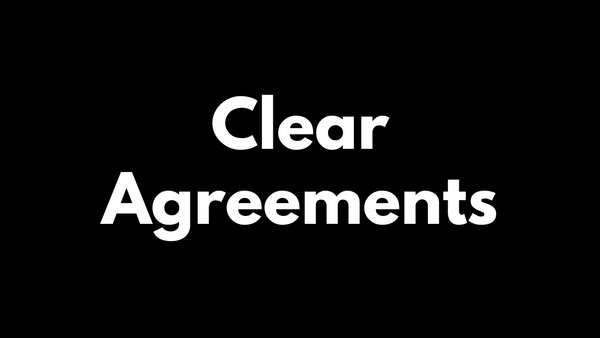
The Simple Power of Clear Agreements
Last week I shared a few tips on better approaches to motivating you team. One of those suggestions involved making clearer agreements, which is worth a quick dive on it’s own.
This is one of those obvious, I-should-do-it tools that we don’t actually apply and then suffer the consequences.
Teams that lack clear agreements suffer fire drills
In the absence of clear agreements, humans make assumptions. Our brains are built to fill in the gaps of information with our assumptions. And assumptions are the breeding ground for resentment, frustration, stress.
If the team is in a pattern of repeated fire drills, a lack of clear agreements is at the core.
How to Make Clear Agreements
Step 1: Begin with a clear request
An agreement starts with a request. It answers WHO will do WHAT by WHEN.
For example: “Can you send me your team’s proposed Q4 OKRs by end-of-day Monday?”
Hints and demands are the enemy of clear agreements.
Hints lack clarity on some part of the WHO will do WHAT by WHEN equation.
Demands exert power to create compliance. And compliance is not agreement. “I need this done by Monday.” is not a clear agreement.
Three examples to make sure this is clear:
- “Can you send me your team’s proposed Q4 OKRs by end-of-day Monday?” is a clear request with a specific WHO, WHAT, and WHEN.
- “I need your proposed Q4 OKRs done by Monday.” is a demand, not a clear agreement.
- “We should align on your objectives early next week.” is a hint that won’t lead to a clear agreement is likely to result in some form of frustration.
Start by requesting what you want. Then move into conversation.
Step 2: Negotiate the request
Once a clear request is made, there are four acceptable responses:
YES: This one is easy, a clear agreement has been made.
NO: A clear agreement has been made to NOT do the request. This is rare as an endpoint, more often a counteroffer is made.
Counteroffer: The receiver of the request wants to modify some component of the WHO, WHAT and/or WHEN. And responds with a clear request of their own. For example, “Would it be ok if I send you our proposed Q4 OKRs on Tuesday, since our team meeting is that afternoon?”
A Clarifying Question that then leads to one of the above 3 outcomes. For example, “Are you hoping that what I share on Monday is finalized or just a draft?” which might lead to a YES, NO, or Counteroffer like the one above.
Once you get to agreement, write it down right then and confirm agreement with those words. there’s two things to do for full impact.
A study done by the American Society of Training & Development found that you have a 65% chance of completing a goal if you commit to someone. Record the agreement and you’ve already stacked the odds in your favor.
Step 3: Accountability Appointments
That same study found that you have a 95% chance of completing a goal with a specific scheduled accountability appointment with the person you’ve committed to. There’s an obvious and simple opportunity here.
In the example above of sharing the Q4 OKRs, you might set a 15-minute meeting for 4:45pm on Monday or Tuesday (depending on which day you agreed to) to do a quick walkthrough of the OKRs. Agree on that and you’re massively likely it gets done.
Clear agreements get supercharged through accountability.
Now you have the formula:
Clear Agreements = Work to be done + By Whom + By When + Accountability Appt.
The Big Opportunity of Clear Agreements
Look, I know that I’m sharing something quite simple here. But if you don’t hold true to the simplest of truths you leave opportunity on the table every day.
There are two core disciplines to clear agreements.
The first is to make them. You know how to do this now.
The second is to set and hold the standard.
Do what you say you’ll do, and when you cannot, renegotiate immediately. Never let things float. Your responsibility as a leader is to set the standard that agreements are our bond. It’s poison to treat them otherwise…for the team, the organization, and for living an empowered life.
Be someone who does what you say, it will transform your life.
Be someone who asks others to do what they say, it will transform your company.